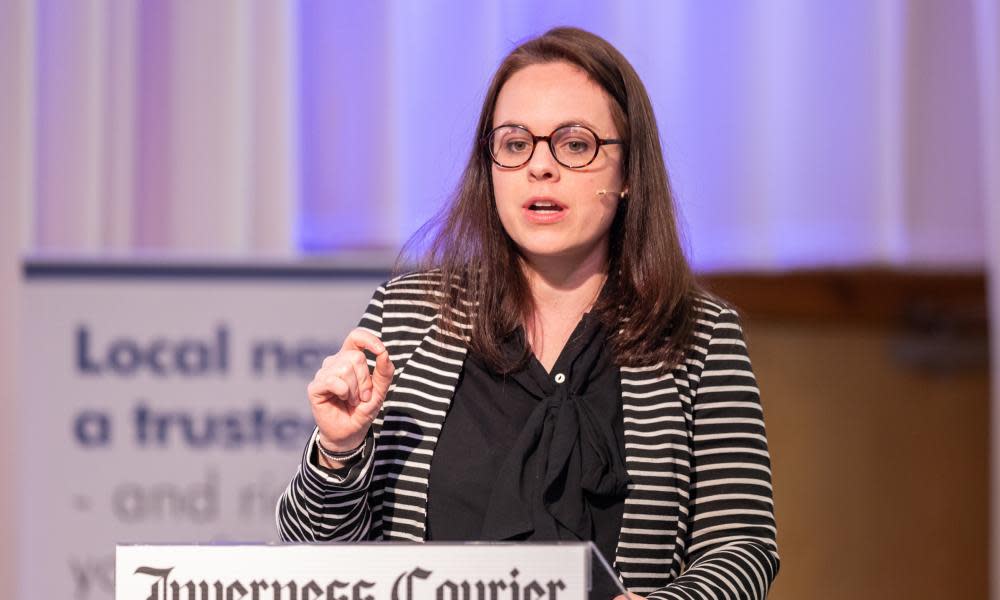SNP members feel disempowered, says leadership candidate Kate Forbes

Scottish National party members feel disempowered and in doubt about whether their party is genuinely democratic, Kate Forbes, one of the frontrunners to replace Nicola Sturgeon, has said.
The Scottish finance secretary told the BBC’s Laura Kuenssberg the dramatic resignation of the SNP’s chief executive, Peter Murrell, who is also Sturgeon’s husband, on Saturday amid a transparency row was a direct result of decisions being taken by “too few people”.
Murrell quit saying he had become a distraction from the contest to replace his wife, in which Forbes is vying with the Scottish health secretary, Humza Yousaf, and the outlying candidate, Ash Regan, to become the next SNP leader.
Murrell also took responsibility for the public being misled after the resignation of the SNP’s head of communications, Murray Foote, who said he had been given false information to feed to journalists about disputed party membership figures by “colleagues at party HQ”.
Responding to a dramatic 24 hours in which the usually disciplined party succumbed to unprecedented turmoil, Forbes told Kuenssberg: “At the heart of this is about the fact that the decisions within the SNP have been taken by too few people. And I think that’s well recognised across the political domain.”
Related: SNP chief executive Peter Murrell resigns amid membership row
She added that SNP members felt “disempowered”, while the Scottish government now required “a wide tent with a big team”.
But, despite her camp raising concerns about the integrity of the leadership ballot last week, Forbes insisted she had “full confidence and trust” in the process.
Pressed on whether she was still calling for an independent auditor to oversee the contest, she said her intention was to give “as much trust and confidence” to members.
Forbes, who does not give interviews on Sunday because of her religious beliefs, was unable to address the turmoil in an interview on Sky’s Sophy Ridge programme because it had been pre-recorded on Friday. The Guardian understands the Kuenssberg interview was also pre-recorded on Friday, but updated on Saturday to take account of the resignations.
Forbes is a member of the socially conservative Free Church of Scotland, which believes that working on Sundays is a breach of the rules unless it is unavoidable on the basis of “necessity or mercy”.
She told the Guardian in a recent interview: “I would work by necessity; I would work on Sundays.”
Forbes told Kuenssberg there was “no question” the SNP was at a crossroads, suggesting the party had lost the ability to listen to the public, not delivered on election pledges and lost “some of the respectful dialogue that we need when it comes to persuading those who are not yet persuaded of the case for independence”.
“We have come through 16 years of successful government. If we are going to see the SNP continue to win elections, continue to take on the opposition, not least the Labour party at the next election, we need to get serious about what’s worked and what’s not worked.”
Later on BBC Scotland’s Sunday Show, the SNP’s president, Mike Russell, who has stepped in as interim chief executive, said the party was in “a tremendous mess” but that the priority now was “a fair electoral process that produces a clear accepted outcome”.
All three leadership candidates have pledged to reform the party’s internal processes after a row about membership figures highlighted deeper concerns about party transparency.
On Thursday, the party revealed the total number of members eligible to vote in its leadership contest had fallen to 72,186, after coming under sustained pressure from all three leadership candidates to release the figures.
The number released was significantly lower than that previously estimated by party sources and briefed to journalists in the early stages of the campaign. It also confirmed a Sunday Mail report from February that the SNP’s membership had slumped by 30,000 since 2021, which Foote originally dismissed as “drivel”.
Murrell and Sturgeon have faced criticism for years about the effect on transparency and accountability of having a married couple at the top of the party.

 Yahoo News
Yahoo News 
